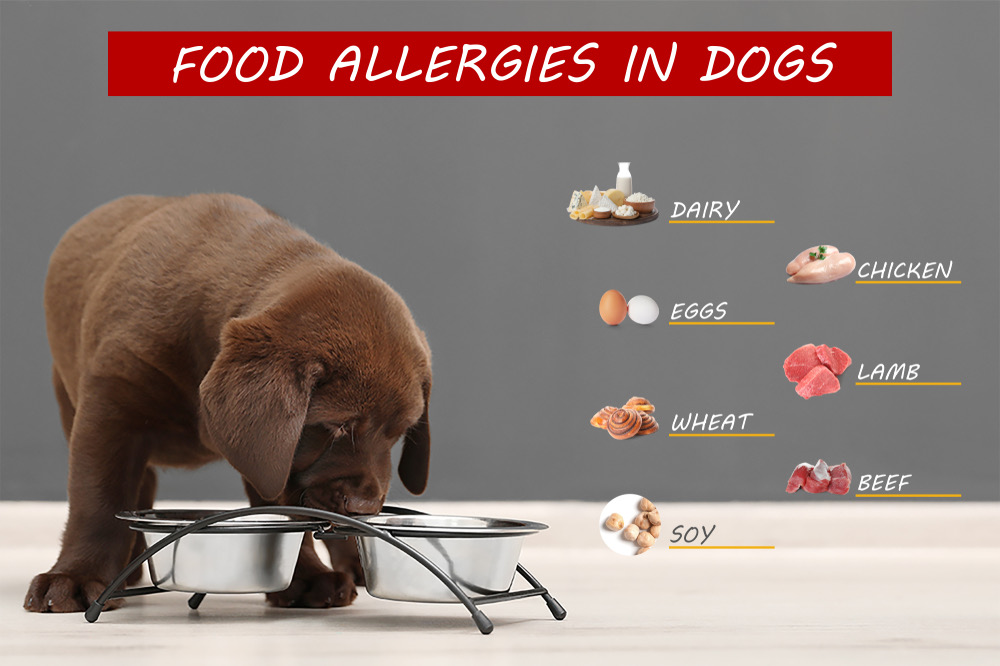Dog Food Allergies

Dog food allergies are one of the more frequently diagnosed forms of allergies in dogs. Many dog owners have jumped on the bandwagon of switching to grain-free diets, assuming that their dog is allergic to, or intolerant of, gluten as many humans are. In fact, in most cases the allergen for dogs is a protein or proteins.
The problem with recognizing a food allergy in pets is that it doesn’t always look like tummy troubles. The signs can be more subtle or manifest as a symptom that you might not associate with food allergies.
If your dog has food allergies, there are signs that will be present. The team at Oakland Veterinary Referral Services is here to discuss dog food allergies and intolerances, and what you can do to help your pet.
Dog Food Allergies
During an allergic reaction, an allergen triggers the immune system to overreact. The foods are harmless until your dog’s immune system starts treating them as a threat. If your dog is allergic to a food item, the most likely culprit is a protein (often more than one). Carbohydrate, preservative or food coloring are much less likely causes of food allergies in dogs.
The most common cause of food allergies in dogs include:
- Beef
- Dairy
- Chicken
- Wheat
- Lamb
- Soy
Clinical Signs of Dog Food Allergies
One would think that diarrhea and vomiting would be the top indicators of a food allergy, which is why pet owners sometimes overlook the signs. But itchiness, rashes, and skin issues are equally common when it comes to dog allergies.
If your pet has been scratching more than usual, or having ear infections and skin problems, they may be allergic to something.
Symptoms associated with dog food allergies include:
- Licking, biting, scratching, rubbing
- Recurring ear infections
- Skin problems like dryness and hair loss
- Licking and biting the paws
- Scooting or licking of anal skin
- Recurrent skin infections
- Diarrhea
- Gas
- Vomiting
Diagnosis of Dog Food Allergies
Many dog food allergies are genetic, but the genetic reaction can manifest very early in puppyhood or after years of sensitization to that food. The early weeks of puppyhood can also trigger food allergies. A dog’s immune system at that age is adapting to, and interpreting its environment. We don’t yet fully understand what can happen at that point that predisposes some dogs to allergies.
First, have your veterinarian rule out other medical conditions. At that point, your veterinarian would place your dog on an elimination trial, the most accurate way to determine food allergies. An elimination trial means that your dog will go off of all the diets and treats they have been eating previously, and begin with a new diet suggested by your veterinarian.
Your dog would be on this hypoallergenic elimination diet until they have improved, approximately 8-12 weeks. You would then do a diet challenge by reintroducing one food that your dog had been eating before. If there is a reaction within 7 days (occasionally up to 14 days), it confirms food allergy. If there is no reaction, you may need to look for another explanation for the improvement–season change, elimination of parasites, resolution of infection.
This can be a lengthy process, but there is no other test that will reliably identify food allergy. Skin testing, blood tests, saliva tests and hair tests all are wildly overstated but do not prove or disprove allergy to certain foods.
Treatment of Dog Food Allergies
The main treatment for a food allergy is to no longer feed your dog what they are allergic to. It is unusual to have new food allergies develop with age. So, once the foods causing the allergy are identified, they should be avoided long-term.
When you remove the food that triggers the allergic reaction, there should be no more reason to have to treat specific symptoms. Feed your puppy or dog high quality foods they aren’t allergic to, and help them have good gut health with the use of prebiotics and probiotics.
When Your Dog Has Food Allergies
If you suspect your dog has food allergies, please contact your veterinarian. If they have determined that your dog has food allergies, or need help with diagnosing and treating other allergies, contact us. Our Dermatology team can give your four-legged friend the correct diagnosis to successfully treat dog food allergies. We partner with your veterinarian to treat complex allergy cases including flea allergies, atopy, and food related allergic reactions.


